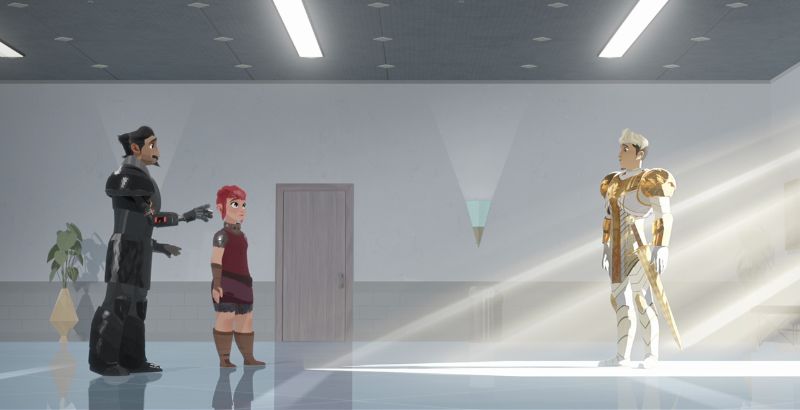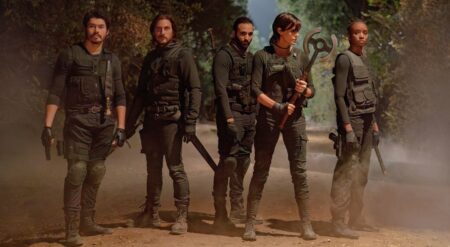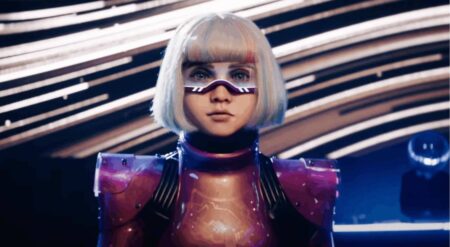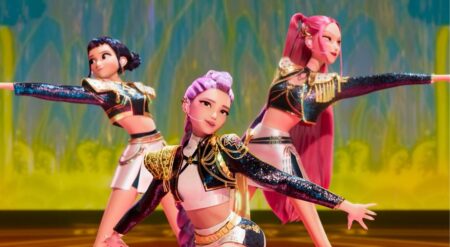
Villains getting origin stories to humanize them is all the rage in cinema lately, but few of them succeed because the deeds done outweigh the pain done to them. But Nimona, the latest animated original from Netflix, doesn’t have that problem. Instead, Nimona takes characters who look like villains from the outside but are victims of circumstance a system put in place to keep them on the outside.
Directed by Nick Bruno and Troy Quane, Nimona embraces fairytales to tell a unique story of belonging and self-acceptance in an epic fashion. The film is based on the National Book Award-nominated New York Times best-selling graphic novel of the same name by ND Stevenson, who you may know from his work as the creator of She-Ra and the Princesses of Power. The film centers on Ballister Boldheart (Riz Ahmed) and Nimona (Chloë Grace Moretz), who become friends in terrible circumstances.
Ballister is a knight in a futuristic, medieval world, who on the day of his knighting ceremony — the first for someone not of noble blood — is framed for a crime. At that moment, his life is taken from him. He loses the one he loves, his future, and the admiration he had gotten from the people of his city. Trapped with nowhere to turn, he meets Nimona, the only one who can help him prove his innocence.
Only, this mischievous teen with a taste for mayhem and anything metal is more focused on working with him because he’s a “bad guy” and not to clear his name. Considered a monster by everyone in the kingdom because of her shapeshifting power, she is more concerned with destroying the royalty and knights who were trained to kill her. Ballister, despite being on the run, is one of them. But with the entire kingdom out to get him, Nimona’s the best (or technically, the only) sidekick Ballister can hope for. And as the lines between heroes, villains, and monsters start to blur, the two of them set out to wreak serious havoc while learning how to accept themselves and right the wrongs of the past.
To put it simply, the talent in Nimona shines through. From the character design and animation style to the voice actors that bring it all to life, it all sings. As Ballister, Riz Ahmed’s voice work is vulnerable and scared while also capturing a questioning depth of the struggles his characters go through. For her part, Moretz is hilariously loud, a boisterous presence who in the last act taps into something somber and heartfelt. And then there is Ambrosius Goldenloin, voiced by Eugene Lee Yang, who brings forward a sense of duty and confusion as he struggles with his internal motivations and the external forces pushing him to capture and kill the man he cares deeply for.

Outside of the performances, Nimona has some of the best action animations of anything out right now or recently, falling second to only Across the Spider-Verse. The fluidity of movement and detail in transitioning from two-dimensional art to three-dimensional is gorgeous in a way I’m not sure I understand enough to talk about. Each frame of the film is dynamic, and each character lives in it beautifully. The character designs are gorgeous and so are the environments in which they live. The kingdom has depth behind its walls and every background is detailed with an atmospheric purpose for every scene.
A beautiful animation, Nimona is also a powerful story of self-acceptance and love with queer elements of identity and the struggles that come with it are present in both Nimona and Ballister. I’m not talking subtext. I’m talking about boldly outlined identities that once you see it, frame the entirety of the story you’re watching. It makes the pieces fall into place even more than they already did once you begin to pull them into the reality we live in today. In addition to telling a story of self-acceptance, Nimona also tells audiences that sometimes systems can’t be fixed, but need to be broken and rebuilt instead. The societal expectation put in place to make us hate ourselves and manipulate us into hiding who we are or feeling shame about it doesn’t deserve to persist. Nimona’s narrative can work for any marginalization, but it’s clear that for this story it’s about queer people.
This is particularly true for one of the conversations that Nimona has with Ballister. He asks her if she could try to just, not shapeshift. Her reply is, “I would die.” It’s delivered as a joke but built upon when she adds that she would live, but she wouldn’t thrive, she wouldn’t be the person she is now and that isn’t living. In the film’s stellar and emotional finale, which I’ll leave mostly unspoiled, Nimona delivers a powerful voice-over. She doesn’t know what is worse, the people wanting to run her through with a sword or the fact that sometimes she wants to let them.
Nimona is a wonderful film for a lot of reasons. The animation team at Blue Sky Studios has an understanding of two-dimensional art and lighting in a three-dimensional plane that has to be admired. The seamless blend of high fantasy and high tech also creates a world worth exploring more. And ultimately, the characters on the screen are easy to feel for, root for, and want to fight for. With fantastic voice acting and relatable human moments, our heroes fight back against a narrative that casts them as villains and does so without platitude or posturing. Instead, Nimona creates an emotive narrative that asks its audience to care by showing vulnerability and beauty and asking us to think about how we treat people based on what we hear about them. Nimona is a story for all ages that leaves its audience with more empathy and understanding than how it found it.
Nimona is streaming exclusively on Netflix June 30, 2023.
Nimona
-
Nimona - 9/109/10
TL;DR
Nimona is a story for all ages that leaves its audience with more empathy and understanding than how it found it.






